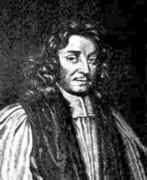Person: Wilkins, John

John Wilkins was an English mathematician who was one of the founders of the Royal Society. He wrote on astronomy and mechanical machines.
Mathematical Profile (Excerpt):
- Wilkins is said to have been appointed to this latter post because of his expertise in mathematics "to which he devoted all his leisure".
- On 13 April 1648 Wilkins was appointed Warden of Wadham College, Oxford.
- Wilkins seems to have travelled to a number of European destinations around this time, probably on returning from Heidelberg where he accompanied Charles Louis.
- Wilkins certainly carried out his duties at Oxford with great skill.
- Wilkins was particularly vigorous in defending the university against these religious attacks.
- Wilkins, in A discourse concerning a new planet (1640), argued strongly for a new approach to science.
- The arguments used are similar to those of Galileo but there is no evidence to suggest that in fact Wilkins had seen the Letter to Castelli by Galileo which contains these arguments.
- Rather the reverse, and we have to say that it is almost certain that Wilkins put forward his arguments entirely independently of Galileo.
- Wilkins was deprived of his post when Henry Ferne claimed that he had been promised the position of Master by Charles I.
- Many at Cambridge regretted Wilkins' departure, particularly Isaac Barrow.
- However, in many ways leaving Cambridge allowed Wilkins to influence the foundation of the Royal Society it a way that would not have happened had he remained there, and this proved to be one of the finest achievements of his career.
- In 1645, while living in London, Wilkins had first become associated with a group of men who would eventually form the Royal Society.
- This Oxford group met in Wadham College while Wilkins was Warden there but, after Wilkins moved to Cambridge, they met at Boyle's lodgings.
- After Wilkins left Cambridge and returned to London he joined with the group which were meeting weekly at Gresham College.
- The Lord Brouncker, Mr Boyle, Mr Bruce, Sir Robert Moray, Sir Paule Neile, Dr Wilkins, Dr Goddard, Dr Petty, Mr Ball, Mr Rooke, Mr Wren, Mr Hill.
- Although he had been dismissed from Cambridge on the restoration of the monarchy, Wilkins was soon in favour with Charles II.
- In 1638 Wilkins published his first book The Discovery of a World in the Moon which was in fact appeared anonymously.
- Again Wilkins was not the first to come up with this suggestion but it is typical of the way that he thought, allowing his mind to roam through ideas which others would have found too unconventional to consider.
- Wilkins worked on codes and ciphers publishing his work Mercury, or the Secret and Swift Messenger in 1641.
- Wilkins also wrote on mechanical devices, publishing Mathematical Magick, or the wonders that may be performed by mechanical geometry in 1648.
- It was all rather sensational, particularly the illustrations, but Wilkins imagination was based on good mathematical principles.
- Two works were particularly important in influencing Wilkins thinking on machines.
- It is fair to note that Wilkins owed quite a debt to Mersenne in a whole variety of areas for the two shared views closely.
- In many ways one can look at Wilkins work as popularising the more technical writings of Mersenne.
- Wilkins' last work, which had to be rewritten since the original was destroyed in the Great Fire of London in 1666, is on a universal language.
- The Second Part is an exhaustive classification of notions in all spheres of thought, P M Roget clearly based his Thesaurus on this work of Wilkins.
- Let us illustrate Wilkins' universal language by giving his own explanation of the symbol.
Born 1614, Fawsley (4, km S of Daventry), Northamptonshire, England. Died 19 November 1672, Chester, England.
View full biography at MacTutor
Tags relevant for this person:
Geography, Origin England
Thank you to the contributors under CC BY-SA 4.0! 

- Github:
-

- non-Github:
- @J-J-O'Connor
- @E-F-Robertson
References
Adapted from other CC BY-SA 4.0 Sources:
- O’Connor, John J; Robertson, Edmund F: MacTutor History of Mathematics Archive
